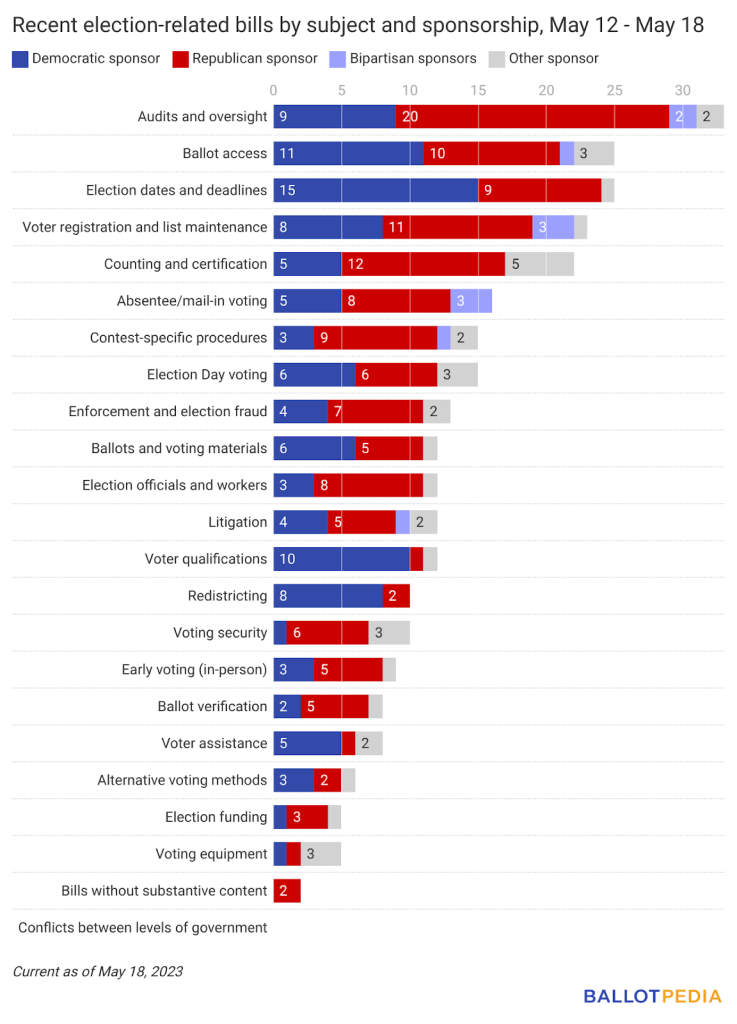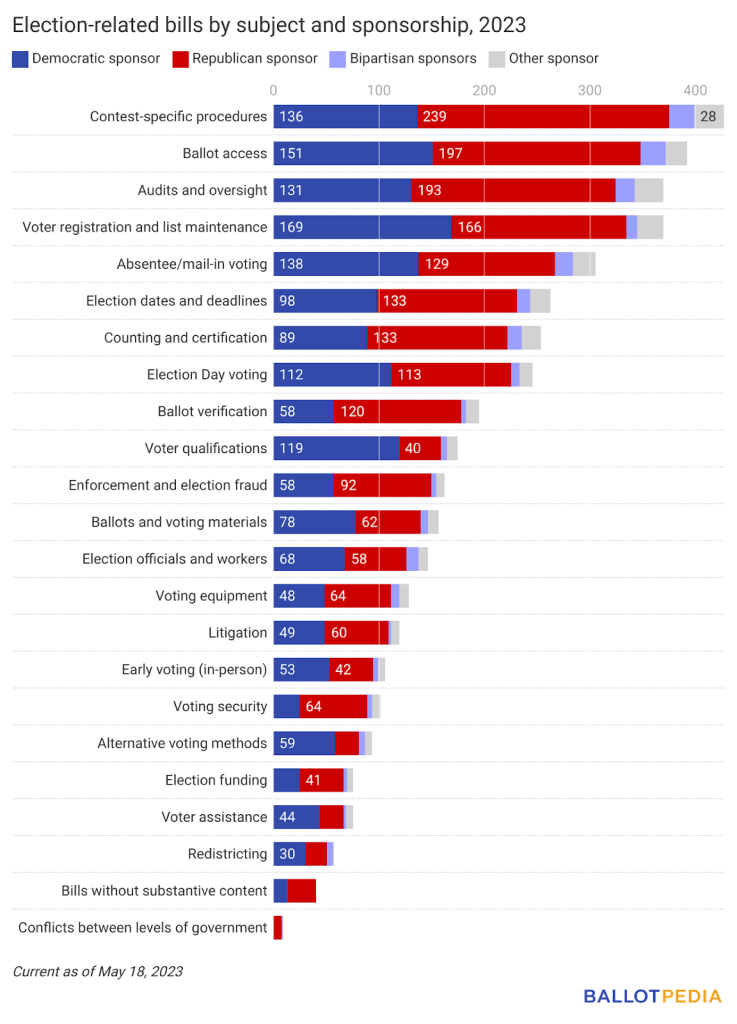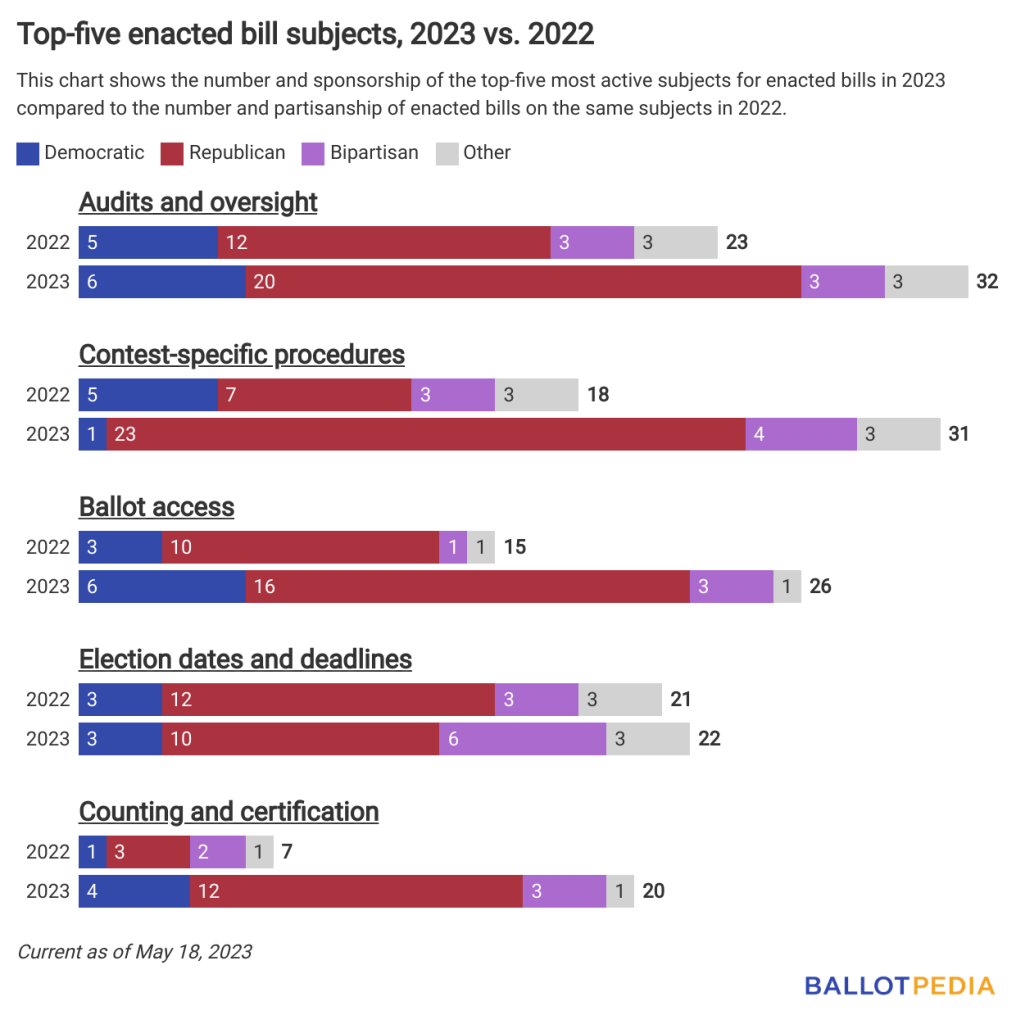Welcome to The Ballot Bulletin: Ballotpedia’s Weekly Digest on Election Administration. Every Friday, we deliver the latest updates on election policy around the country, including legislative activity, nationwide trends, and recent news.
In today's issue, you'll find:
- Legislative activity: About the bills acted on this week and a big-picture look at all the bills we have tracked this year.
- Recent news: Noteworthy developments in election policy at the federal, state, and local levels, including litigation and ballot measures.
Legislative activity
State legislatures acted on 166 election-related bills from May 12 to May 18, up from 148 bills the previous week. Of these, 90 either passed one chamber, passed both chambers, were enacted, or were defeated.
Highlights:
- These 166 bills represent 6.6% of the 2,515 election-related bills introduced in 2023. At this point in 2022, 125 bills had been acted on in some way in the past week, and we were tracking 2,533 election-related bills, 0.7% more than this year.
- Of the 90 bills moving beyond the introductory stage in the past week, 15 (16.7%) are in Democratic trifecta states, 55 (61.1%) are in Republican trifecta states, and 22 (24.4%) are in states with a divided government.
- The bill topics with the most legislative activity this week were audits and oversight (33), ballot access (25), election dates and deadlines (25), voter registration and list maintenance (23), and counting and certification (22).
Recent activity and status changes
Of all election-related bills in state legislatures in 2023:
- 148 have been enacted (+14 from last week)
- 9 passed both chambers (-22)
- 240 passed one chamber (+33)
- 2 advanced from committee (No change)
- 1,869 have been introduced (+15)
- 238 are dead (+16)

Enacted bills
States have enacted 148 election-related bills in 2023, 33 more than the 115 bills states had enacted at this point in 2022. Of these 148 bills, Democrats sponsored 22 (14.9%), Republicans sponsored 91 (61.5%), and 19 (12.8%) had bipartisan sponsorship. Committees or legislators with a party affiliation other than Republican or Democrat sponsored the remaining 16 (10.8%) bills. To see all bills approved this year, click here.

Bills enacted since May 12, with their official titles, are listed below.
South Carolina (Republican trifecta)
Tennessee (Republican trifecta)
- TN SB0978: AN ACT to amend Tennessee Code Annotated, Title 2, relative to polling places.
- TN HB1254: AN ACT to amend Tennessee Code Annotated, Title 2, relative to elections.
Texas (Republican trifecta)
- TX SB1052: Relating to the compensation of an election judge or clerk.
Washington (Democratic trifecta)
- WA SB5112: Updating processes related to voter registration.
Bills that passed both chambers
Nine bills have passed both chambers (but have not yet been enacted) in 2023, 14 less than the 23 bills that had passed both chambers at this point in 2022. To see all bills that have currently passed both chambers, click here.
No bills passed both chambers since May 12.
Defeated bills
Two-hundred and thirty-eight bills have been defeated in committee or by a floor vote in 2023, 46 more than the 192 bills that were defeated at this point in 2022. To see all bills that have been defeated in 2023, click here.
One bill has been defeated since May 12.
Recent activity by topic and sponsorship
The chart below shows the topics of the bills state legislatures acted on since May 12. Click here to see a full list of bill categories and their definitions.

* Note: Contest-specific procedures refers to primary systems, municipal election procedures, recall elections, special election procedures, and other systems unique to a particular election type.
All 2023 bills by topic and sponsorship
The chart below shows the topics of a sample of the 2,515 bills we have tracked this year. Note that the sums of the numbers listed do not equal the total number of bills because some bills deal with multiple topics.

Enacted bills by topic and sponsorship, 2022 vs. 2023

Recent activity by state and trifecta status
Sixty-four (38.6%) of the 166 bills with activity this week are in Democratic trifecta states, 68 (41%) are in Republican trifecta states, and 34 (20.5%) are in states with divided governments.
Of the 90 bills moving beyond the introductory stage in the past week, 15 (16.6%) are in Democratic trifecta states, 53 (58.9%) are in Republican trifecta states, and 22 (24.4%) are in a state with a divided government.
The map below shows election-related bills acted on in the past week by state trifecta status.

All 2023 bills by state and trifecta status
Of the total bills introduced in 2023, 1,079 (42.9%) are in states with Democratic trifectas, 1,138 (45.2%) are in states with Republican trifectas, and 298 (11.8%) are in states with divided governments.
Texas legislators have introduced the most election-related bills this year. Texas holds legislative sessions in odd years only, and so had no activity in 2022. New York was the most active state at this point in 2022. South Dakota has enacted the most bills this year. In 2022, New York and California had enacted the most bills at this point.
The map below shows the number of election-related bills introduced by state in 2023 by state trifecta status.

Recent news
Wyoming court dismisses voter ID challenge
The Wyoming Second District Court dismissed a challenge to the state's voter ID requirements on May 16. Former State Rep. Charles Pelkey (D) originally sued in Albany County District Court challenging a requirement that voters present a government-issued ID when casting a ballot. That requirement was part of HB0075, which the state enacted in 2021. Pelkey's complaint said, "State government has every photo that satisfies its needs to identify voters, acquired when a voter registered. That same photo could instantly display for poll workers to recognize that voter’s fundamental right to vote." Judge Dawnessa Snyder ruled the plaintiffs did not show "who was harmed, when the harm occurred, or even if harm is likely to occur," adding, "There are not even any allegations that [the plaintiff] has been refused the opportunity to vote by failing to provide one of the acceptable forms of identification." Secretary of State Chuck Gray (R), who sponsored the legislation while a member of the Wyoming House of Representatives, said, "I was extremely pleased with Judge Snyder’s decision to dismiss the nonsensical, absurd lawsuit attacking Wyoming’s landmark voter ID law. As the prime sponsor of Wyoming's voter ID law, I’ve worked diligently to ensure its ultimate passage, and I never doubted for a second that it would survive constitutional scrutiny."
Group sues over special election for Ohio ballot measure
One Person One Vote sued the State of Ohio on May 12 in the Ohio Supreme Court over an August special election for a ballot measure requiring 60% of voters to enact a constitutional amendment rather than a simple majority. The group sued on behalf of three Ohio voters, arguing state law "expressly limits special elections on constitutional amendments to November, March (coinciding with presidential primaries), or May. It does not permit statewide August elections for any purpose." One Person One Vote spokesperson Dennis Willard said, "The question every voter should be asking themselves is – why August, when there was already an election scheduled for November? The answer is simple: because that’s what special interests wanted. Special interests spent millions lobbying for an August election – which will cost taxpayers $20 million – specifically because that’s when turnout is the lowest." Senate President Matt Huffman (R) said he expects the election will occur as planned. "I would guess probably for the last 10 years, every election there was a lawsuit filed over something and some injunction. Typically, the secretary of state will continue to move forward as though the election is going to happen. Certainly if the Supreme Court ultimately ruled that for some reason, some constitutional requirement wasn't followed, there wouldn't be an election, but that's not my expectation," Huffman said.


